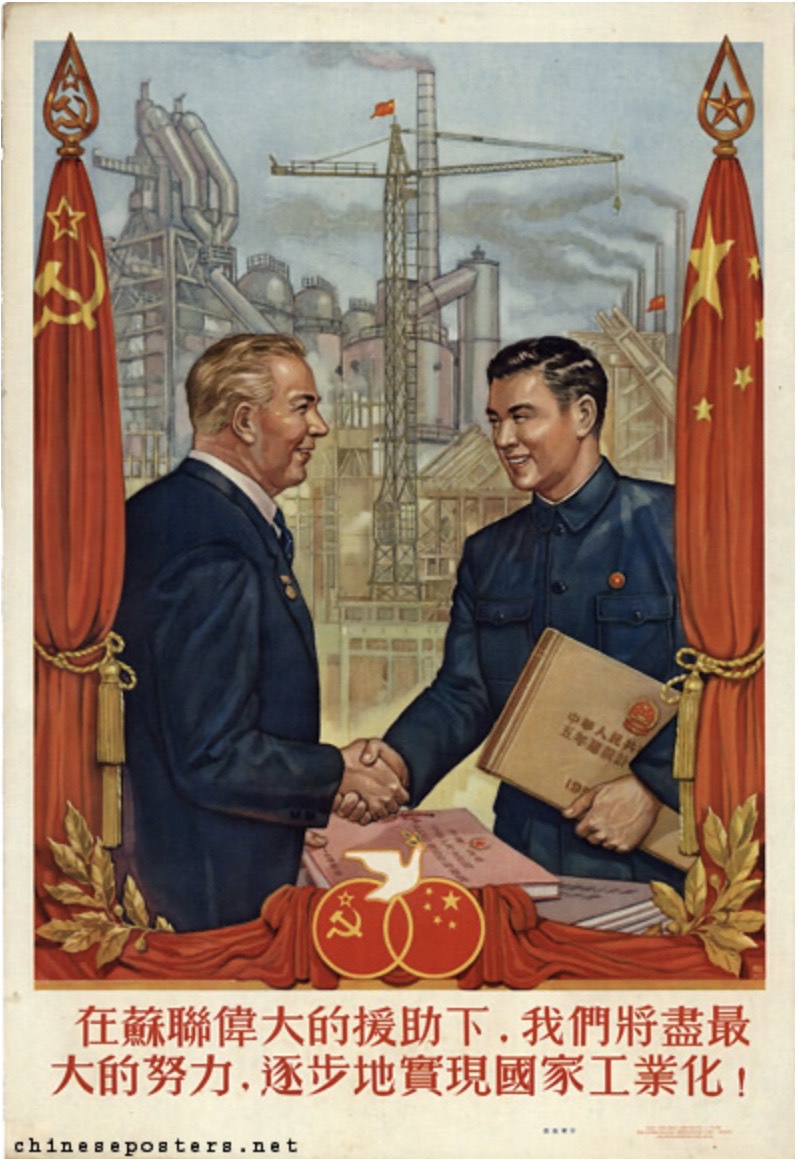“With the great support of the Soviet Union, and our own greatest strength, we will realize the industrialization of our nation step by step!”—Chinese poster from 1953
To find how a people who’ve been economically dispossessed by international capital can defeat it, and eliminate the poverty that it’s created within their society, look to what the People’s Republic of China and its surrounding socialist countries have done: implement a program of industrial growth. Even the DPRK, which unlike China hasn’t undergone free market reforms and is the furthest along towards making the bourgeoisie nonexistent, has had to make industrialization a part of its development.
This has been only logical when China, the DPRK, Vietnam, and Laos all came out of eras in which their economies had been “degrown” by imperialist powers; whether with the brutal occupations and opium-facilitated destruction the imperialists subjected China to, or the bombings the imperialists subjected these other countries to with the aim of continuing to similarly subjugate them. Industry was indispensable for them to be able to rebuild and to thrive; Pol Pot’s non-Marxist peasant revolt in Cambodia, with its reactionary “socialism” where historical development got set backward, proved there wasn’t a sustainable alternative to this path which Asia’s socialist republics have taken.
The conditions of the modern United States are obviously different from those of these countries right after they started on their recovery from imperialism; yet they have something big in common, that being a situation where the population has been profoundly damaged by the effects of international capital. We can’t ignore this harm when it comes to the USA’s people; to do so is to reinforce the absurd assertions from the anti-Marxist “third worldists” about how the majority of Americans supposedly belong to the aristocracy of labor. To justify their anti-Marxist stance, these third worldists point to how the USA’s workers overwhelmingly lack the role of producers. This portrays the situation of these workers out of context; they’re not lacking in productive jobs because of how high they rank within the socioeconomic hierarchy, but because of how low they rank within this hierarchy.
The U.S. communities that have seen their industrial bases relocated haven’t had their workers simply move to the metropolitan areas and find high-paying jobs; to suggest this, as the third worldists appear to be suggesting, is to deny both the reality that these communities are now poor, and the reality that poverty makes it much more difficult for people to leave where they live. What’s happened to these communities is a slow-motion economic collapse, furthered by the great economic shocks of the 21st century such as the 2008 crisis and the pandemic’s mismanagement.
Within this paradigm of collapse, many have taken jobs that don’t make them able to regularly pay for rent, food, bills, or transportation without going further into debt; many others have simply become homeless, with there even being overlap between those who can’t get housing and those who have jobs. These are the effects that letting our economy be defined by the preferences of international capital have had: pushing a large fraction of the population out of the functioning part of the economy, with the inflation exacerbated by Biden’s Ukraine proxy war recently having grown this fraction even more.
How can we eliminate this poverty that capital has made so prevalent within our society? Not by doing what the reactionary socialists want, and degrowing the economy; instead, by implementing a program of green re-industrialization, where the developmental outcomes required for abolishing poverty get reached at the same time that we bring down emissions.
When I say the “reactionary socialists,” I’m referring to a particular element within a broader category of the American “left;” one that’s fundamentally unserious about doing what’s necessary for a successful socialist revolution. What we now call the “left” in America is based not in actual class struggle, but in a series of critical theories that the three-letter agencies have propagated across academia through agents like Herbert Marcuse. Theories that don’t compliment Marxism, but act as a substitute for Marxism. Henry Winston described how this co-optation has gone along with the rise of the Maoist strain of ultra-left thought:
It was especially under the influence of Marcuse and Maoism that the New Left radicals began to be attracted to one or another pseudo-revolutionary theory, including the concept of an “’internal colony” of Black people in the U.S. While Marcuse’s ideas are not identical with “the thought of Mao,” the views of both stimulated anti-Marxist misconceptions of the world revolutionary process, the historic role of the working class and its relationship to the liberation struggles of oppressed people, and the imperative need for strategies based on the specific features and historic development of each country, each working class and each national liberation movement.
Essentially all of today’s U.S. “left” is informed by these supposedly subversive theories. They’re what’s so far kept a serious communist movement from re-emerging since McCarthyism, and since the subsequent destruction of the Panthers; because the predominant mentality within modern “radical” spaces is not oriented around what we can do to win against the state, but around how to appeal to the others within the “left” niche. Our tasks of fighting the information war against NATO, building a united anti-imperialist front, and uniting the workers around their common interests are viewed with apathy; instead, says the New Left, focusing on identity is most important.
What makes this mentality so easy to become assimilated into is that the struggles of Native, Black, LGBT, and other especially oppressed peoples are indeed crucial; Parenti recognized this. What Parenti also said in the the same essay is that an “anything but class” left exists, one which lets identity hinder the revolutionary cause by refusing to come to a synthesis between identity and class.
It’s this way of thinking, defined by a phobia of focusing on class too much for fear of being “class reductionist,” that’s conducive to reactionary socialism as we primarily see it today. That being the type of “socialism” which developing radicals come to embrace when their notion of what things should look like after the revolution is informed by uncritical acceptance of degrowth.
To be a degrowther, you have to lack a serious class analysis. Even though degrowth, this vague, broad call to shrink the economy, has been accepted and promoted by the most powerful elements of global capital, these radical liberals see nothing suspicious about it; they appear to assume that even though degrowth is an idea shared everywhere from Davos to the our media outlets, it can still be implemented in a socialist form. The truth is that whatever ways we’ll need to shrink the economy to save the planet, these reductions won’t be as big as the expansions which will also be necessary; necessary for lifting the people out of poverty. For building nuclear plants to replace fossil fuels; for building high-speed rails to replace cars; for building localized means of making our society more independent in its consumption of food, and of everyday goods.
To frame our needs via the “degrowth” label is to do nothing besides reinforce the control of the Democratic Party over radical spaces, thereby making revolution less possible and ensuring that the climate austerity plans of the capitalists get realized. There’s a reason why EU vs. Disinfo, the site dedicated to “debunking” supposedly false accusations made against the NATO countries, has felt it worthwhile to respond to the statements pointing out how austerity is at the core of capitalism’s “solution” to the climate crisis:
“Malthusianism” is a concept that stems from 18-century British priest Thomas Robert Malthus. Malthus described how a growth in the production of food led to a population growth. This growth would eventually lead to a shortage of food. Malthus feared that improvement of living conditions would increase the population and provoke famine. Hence, population must be kept low. Helping the poor meant, according to Malthus, only creating more poverty as more people survive and need to share the limited resources. If poor people die off, the rest of us can remain well fed…Some pro-Kremlin disinformation outlets suggest that this idea – “let the poor die” – is a master plan of shadowy rulers.The Straw Man is a formidable instrument for dishonest argumentation, similar to the loaded question: “Have you stopped beating your spouse?” The coronavirus pandemic is allowing the pro-Kremlin disinformation outlets to master their talents in constructing Straw Men…neither Bill Gates, nor the Brits, Greta Thunberg, or Barack Obama has ever suggested mass murder. These claims are classical “Straw Men” arguments. “Attack your opponent with claims never made!”
You only need a basic understanding of how capitalism treats the lower classes during times of crisis; of the history of the rich sacrificing the poor to preserve the existing economic order; to see that these pro-hegemonic figures (who include Thunberg) are in effect calling to sacrifice the poor when they vilify growth. Growth is not an intrinsically bad thing, it’s a tool that can be used for ill or for good depending on which class is utilizing it. To blankedly reject it is to in practice advance the eco-fascist designs of the ruling class.
Imperialism-compatible leftists take the degrowth stance for the same reason they either oppose existing socialism; or at the least oppose multipolarity, and actions that advance multipolarity such as Russia’s special operation. They take these stances because their goal is not to win, it’s to build a movement for its own sake. The “Marxists” who’ve broken from the struggle for multipolarity have handicapped their ability to gain power; a “socialist” movement that prioritizes tailing the Democratic Party over being principled on anti-imperialism is destined to remain inert. And if they were to gain power, the reactionary socialists among them who’ve aggressively embraced degrowth will sabotage the socialist project like Pol Pot did. We need to take example from the existing socialist countries, and back pro-multipolar actions while recognizing the value of industry.
————————————————————————
If you appreciate my work, I hope you become a one-time or regular donor to my Patreon account. Like most of us, I’m feeling the economic pressures amid late-stage capitalism, and I need money to keep fighting for a new system that works for all of us. Go to my Patreon here.
To keep this platform effective amid the censorship against dissenting voices, join my Telegram channel








